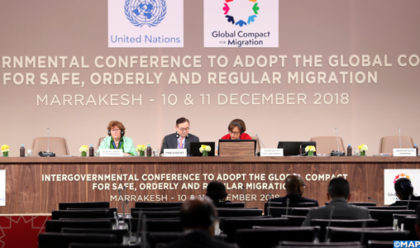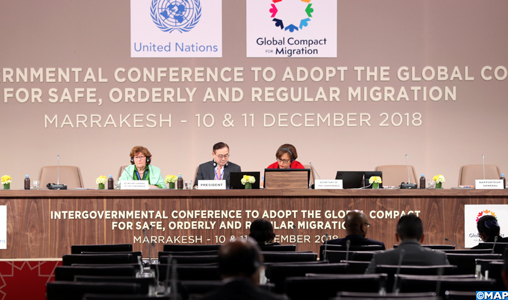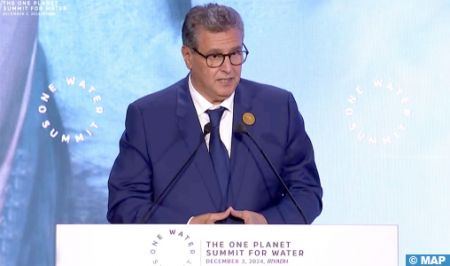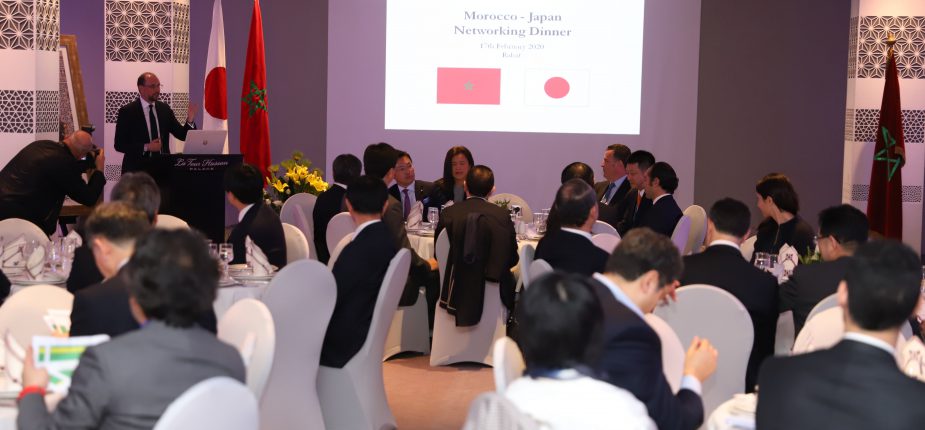 The Global Compact on Migration (GCM), which was adopted on Monday in Marrakech, was hailed by world leaders, senior Govt officials, representatives of civil society and migrants as a “historic event” and the best way to address the issues of migration at the local, national, regional and global levels.
The Global Compact on Migration (GCM), which was adopted on Monday in Marrakech, was hailed by world leaders, senior Govt officials, representatives of civil society and migrants as a “historic event” and the best way to address the issues of migration at the local, national, regional and global levels.
Participants in the two-day Intergovernmental Conference on GCM seeking to ensure a “safe, orderly and regular migration”, said this global agreement expresses collective commitment to improving cooperation on international migration which affects countries, communities, migrants and their families.
The opening ceremony of the UN conference was marked by the message addressed by King Mohammed VI of Morocco to participants, stressing the importance of the venue since there is no better place to host the UN-sponsored Intergovernmental Conference than Africa.
But “we still have a lot more to do,” said the Monarch in his message read out by Head of Govt Saad-Eddine El Othmani. Morocco is a country of origin, transit and destination for migrants, and Marrakech is a cross-roads for all civilizations, added the King in his message.
He called for a shared responsibility to stem chaos and ensure that the migrants’ human rights are upheld. “This is a page of history we are writing in Marrakech,” underlined the Moroccan Sovereign, affirming that today’s step towards fairer migration should be a source of global pride.
For his part, UN Secretary-General António Guterres described in opening remarks the Global Compact as a road map to prevent suffering and chaos.
The Global Compact provides a platform for “humane, sensible, mutually beneficial action” resting on two “simple ideas”: that migration should be well managed and safe, and that national policies are far more likely to succeed if coupled with international cooperation. He stressed that GCM is not a treaty and does not impose policies on UN member States, nor is it a legally binding instrument.
“We must not succumb to fear or false narratives” about migration, he said, denouncing the “many lies” spread on this agreement, which must now be the subject of a final vote of ratification, December 19 at the UN General Assembly.
The UN Chief expressed hope that the countries which are not present today in Marrakech will see the Global Compact’s value and join in this common venture.
Some States, including the United States, which did not endorse the Compact, and more than a dozen other countries either chose not to sign the accord or are still undecided, mostly because of the pressure exerted by nationalist movements.
General Assembly President María Fernanda Espinosa Garcés acknowledged that, while negotiations were long and difficult, they were worth it as the Global Compact is the best consensual way to tackle migration issues.
Moroccan foreign minister Nasser Bourita, President of the Intergovernmental Conference to Adopt the GCM, said : “we have spared no effort to undertake our responsibility” as a leader on the migration issue and in defending the principles of common responsibility and consensus on migration, and combating smuggling of refugees and migrants.
Referring to Mr. Guterres who challenged the myth that developed countries no longer need migrant labor, German Chancellor Angela Merkel said her country will need more skilled labor from outside the European Union and has a vested interest in legal migration.
“States cannot accept that traffickers are the ones deciding who crosses borders. We must settle such matters among us,” she said, supporting multilateralism to address migration challenges.
Chairman of the African Union Commission Moussa Faki Mahamat stressed the need to build international consensus on migration, saying that the African continent backs consensual solutions and shows deep commitment to multilateralism.
Mr. Süleyman Soylu, Turkish interior minister, said his country is not trying to prevent migration, but rather to manage it by controlling its land and maritime borders. “There are 3.6 million Syrians under Turkish protection and more than 322,000 tons of assistance has been delivered through 14 Turkish border gates”, he recalled.
For Cheryl Perera, founder of OneChild, an organization that empowers young people to act against sex trafficking of minors, the global compact on migration “does not end in Marrakech”. She urged Governments to provide young people with a seat at the table in its implementation, follow-up and review.



